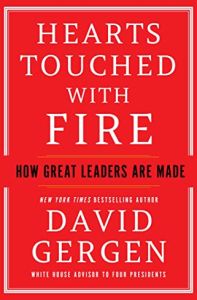
Hearts Touched with Fire
How Great Leaders are Made
First Edition: 2022 more...
ISBN: 9781982170578
Pages: 320
Recommendation
Even casual students of US history know that Franklin D. Roosevelt lost the ability to walk after contracting polio. Serious scholars know that the devastating illness reshaped his character. In this study of what makes leaders great, veteran White House adviser David Gergen argues that suffering and failure can create turning points that improve a person’s life. FDR was a dilettante before polio, and a master statesman after. Civil rights hero John Lewis forged his identity while enduring racism and police beatings. Devastating personal losses shaped Joe Biden. Gergen offers insights into famous leaders’ life-changing moments and provides valuable leadership counsel, as he did throughout his career as an adviser to George H.W. Bush, Bill Clinton, Gerald Ford and Ronald Reagan.
Summary
About the Author
Senior political analyst for CNN David Gergen served as a White House adviser to Richard Nixon, Gerald Ford, Ronald Reagan and Bill Clinton. He wrote the New York Times bestseller Eyewitness to Power.











Comment on this summary